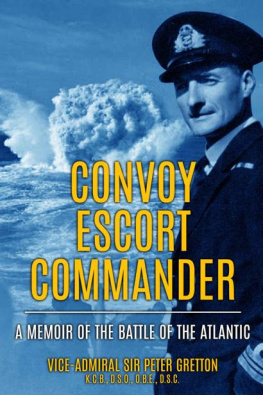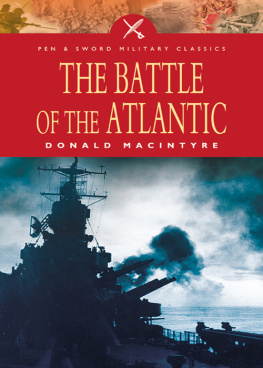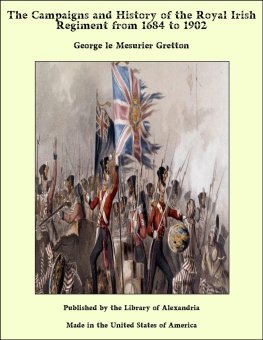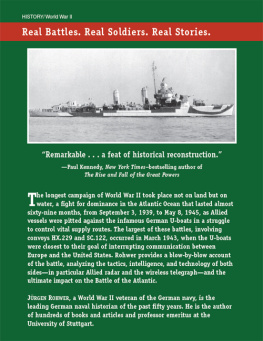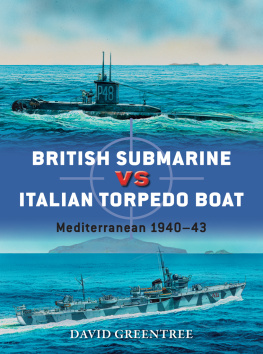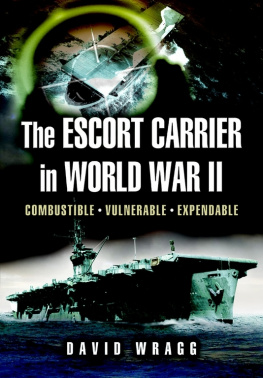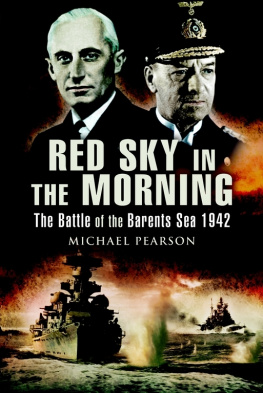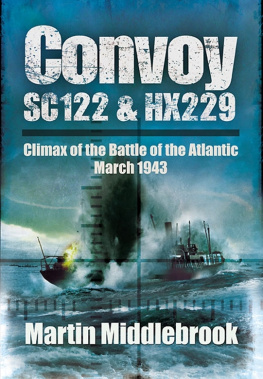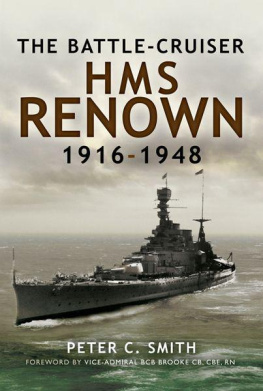Peter Gretton - Convoy Escort Commander: A Memoir of the Battle of the Atlantic
Here you can read online Peter Gretton - Convoy Escort Commander: A Memoir of the Battle of the Atlantic full text of the book (entire story) in english for free. Download pdf and epub, get meaning, cover and reviews about this ebook. year: 2021, publisher: Sapere Books, genre: Non-fiction. Description of the work, (preface) as well as reviews are available. Best literature library LitArk.com created for fans of good reading and offers a wide selection of genres:
Romance novel
Science fiction
Adventure
Detective
Science
History
Home and family
Prose
Art
Politics
Computer
Non-fiction
Religion
Business
Children
Humor
Choose a favorite category and find really read worthwhile books. Enjoy immersion in the world of imagination, feel the emotions of the characters or learn something new for yourself, make an fascinating discovery.
- Book:Convoy Escort Commander: A Memoir of the Battle of the Atlantic
- Author:
- Publisher:Sapere Books
- Genre:
- Year:2021
- Rating:5 / 5
- Favourites:Add to favourites
- Your mark:
- 100
- 1
- 2
- 3
- 4
- 5
Convoy Escort Commander: A Memoir of the Battle of the Atlantic: summary, description and annotation
We offer to read an annotation, description, summary or preface (depends on what the author of the book "Convoy Escort Commander: A Memoir of the Battle of the Atlantic" wrote himself). If you haven't found the necessary information about the book — write in the comments, we will try to find it.
Peter Gretton: author's other books
Who wrote Convoy Escort Commander: A Memoir of the Battle of the Atlantic? Find out the surname, the name of the author of the book and a list of all author's works by series.
Convoy Escort Commander: A Memoir of the Battle of the Atlantic — read online for free the complete book (whole text) full work
Below is the text of the book, divided by pages. System saving the place of the last page read, allows you to conveniently read the book "Convoy Escort Commander: A Memoir of the Battle of the Atlantic" online for free, without having to search again every time where you left off. Put a bookmark, and you can go to the page where you finished reading at any time.
Font size:
Interval:
Bookmark:
CONVOY ESCORT COMMANDER
Vice-Admiral Sir Peter Gretton K.C.B., D.S.O., O.B.E., D.S.C.

To the men of the Allied Merchant Navies and of the Allied Navies and Air Forces who gave their lives in the Battle of the Atlantic, 3rd September 1939 to 8th May 1945
TABLE OF CONTENTS
INTRODUCTION
I EMBARKED on this book, at the suggestion of friends, in 1956. Before starting work, I asked two senior Admirals who were serving at the Admiralty whether they thought that it would be correct for an officer still on the active list to publish a book about his wartime experiences. Both replied, Yes, it would be good for the Navy, so I went ahead. Later on, when the book was nearly finished, I wrote to the Admiralty for permission to consult some special papers in connection with the book. The reply gave me permission to see the records, but added that it was against Admiralty policy for serving officers to publish books about their experiences. This accounts for the delay in publication!
The text has been amended a little since 1956 and some additions made too, for since then much official history has been written and several good personal accounts published which enable one to get a much more accurate picture of what really happened. In particular, Ronald Seths excellent book The Fiercest Battle , which describes the passage of Convoy ONS 5 in which my group took a prominent part, gives many facts, especially about the fate of the merchant ships, which I did not know before. So I hope that this version will be better in every way than the original one.
I kept no diary during the war and few records. I have an indifferent memory for dates and for some of the more unpleasant experiences. So I apologize in advance for any mistakes, which are mine alone. Moreover, any opinions expressed are also my own and have no official sanction.
The main reason why I wrote this book was that I had a long apprenticeship in convoy work during 1939, 1940 and 1941 which proved an excellent preparation for the task of escort commander in the years 1942-4 . In the spring of 1943, B 7 Escort Group had the good fortune to be engaged in three successive convoy battles against wolf packs assembled in great strength. At the end of May, Doenitz withdrew his U-boats from the North Atlantic to refit and re-arm, and the first and most critical part of the battle had been won. Then, in October 1943, after a quiet summer, my group had a busy and fruitful cruise of twenty-five days at sea as a support group with a roving commission between threatened convoys. This was the time of the introduction of the German acoustic torpedo, which listened for ones propeller noises and then homed on the screws and of the return of the U-boats to the North Atlantic.
I believe therefore that although I have no special claim to skill in sinking submarines, I am well qualified to discuss the art of escorting convoys across the North Atlantic. Moreover, many of the lessons learnt at such cost in the last war are being forgotten, just as precisely the same lessons were forgotten after 1918 and after the Napoleonic wars. I hope that this book will jog a few memories, for the facts are still important even in a nuclear age. I have confined the preaching mostly to the last two chapters. These will seem a little technical, but will I hope be found interesting. The remainder of the book describes my personal experiences.
My group was lucky to have been closely involved in two of the turning points of the Battle of the Atlantic, and doubly lucky because in each case we were allowed a few months preparation of tough but uneventful escort duty, during which we were able to develop into a well-knit and competent team. If we had met the enemy in such numbers earlier, the result might well have been different.
In fact, in retrospect, it all seems miraculous. What would the Naval Staff College appreciation have been in, say, 1934 of a situation in which a convoy of forty ships with a best speed of seven knots was preparing to sail westwards in ballast in bad weather, with an escort consisting of two destroyers, one frigate, and four corvettes which were slower than the opposing U-boats? In which air cover for the convoy was scanty generally and non existent in the mid-Ocean gap, and in which no less than sixty U-boats were deployed in the Atlantic, poised to attack the convoy at one stage or another of its passage? A situation, also, in which the enemy were able to break our cyphers and thus establish the position of most convoys in the Atlantic? I think the staff solution would have been annihilation. But the outcome of the passage of convoy ONS 5 was very different.
I realized at the time and I realize even more clearly now how lucky I was to have had such an outstanding team. The Captains of the ships, whom I have listed by name in Appendix II, were well above average. They were keen, competent and full of initiative. Their subsequent careers, in war and peace, in many parts of the world and in many professions, have been uniformly successful, and as naval officers, as master mariners, as industrialists and as chartered accountants, all have prospered. I was also blessed with a very good staff.
I have been given much help in writing this book and a list of names would be a long one. But my special thanks are due to the Admiralty Records Office and to the Historical Sections of the Admiralty and the Air Ministry.
PETER GRETTON
Wimbledon, 1st June 1963.
1. EAST COAST CONVOY
WHEN the war started in September 1939, I left the Royal Naval College, Dartmouth, where I was serving on the staff, at short notice; and after a fortnights gunnery course to learn about the new form of armament with which I should have to compete, I was appointed First Lieutenant of the Vega , a World War I destroyer, which was being converted to anti-aircraft and antisubmarine (A/S) escort duties.
The start was in the best traditions. My appointment directed me to report to Portsmouth dockyard to join the ship, but after my Munich crisis experience I was too wary to be caught by that game again I took the precaution of ringing up a friend at Pompey first, and found, as I expected, that my ship was at Devonport. (During the Munich mobilization of 1938, I had left the West Country by car to join the Vanquisher , which the Admiralty practical-joke department had informed me was at Weymouth; and after drawing Portland, Portsmouth, and Chatham blank, I finally ran her to earth lying at a buoy at Sheerness!)
On arrival at Devonport, I found the Vega s conversion still only half finished, and a most important month was spent before commissioning. At that time, we all thought that we were going to miss the great battle. Why, I cannot think, because it must have been clear that the war was not going to be a short one. But we spent much time calling on those lucky ships which were operating at sea, and used to listen greedily to their experiences.
Eventually, after four long weeks, the time came to commission. There were only about a dozen men standing by her at the dockyard, together with most of the officers, and we were able to make our plans and be as well prepared as forethought could make possible.
The morning of commissioning was fine, and the official inspection of the ship, and the brief ceremony when the dockyard handed her over to us, went well. Directly the Captain of the Dockyard, who had done the inspection, left, however, the rain started to fall as only West Country rain can, and the commissioning proper started. The ship was manned by a Portsmouth crew whose train arrived over an hour late. The station was some way away, there were no buses, covered lorries were impossible to find, and both the men and their hammocks were wet before they were finally on board. It was pitch dark for the blackout was taken very seriously in those days and it is still a mystery to me how we managed to get them all, with their bags and hammocks, on board safely.
Next pageFont size:
Interval:
Bookmark:
Similar books «Convoy Escort Commander: A Memoir of the Battle of the Atlantic»
Look at similar books to Convoy Escort Commander: A Memoir of the Battle of the Atlantic. We have selected literature similar in name and meaning in the hope of providing readers with more options to find new, interesting, not yet read works.
Discussion, reviews of the book Convoy Escort Commander: A Memoir of the Battle of the Atlantic and just readers' own opinions. Leave your comments, write what you think about the work, its meaning or the main characters. Specify what exactly you liked and what you didn't like, and why you think so.

